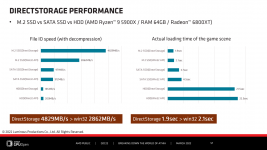(haven't watched yet)
Related article:
https://www.eurogamer.net/digitalfoundry-2023-forspoken-pc-tech-review (Only skimmed the DirectStorage stuff)
"One of the few bright spots of Forspoken on its PC are related to its loading times, which are excellent - in some cases, faster than the already near-instantaneous PS5 version. This is because this is the first shipping title with DirectStorage 1.1, Microsoft’s toolbox for cutting down loading times on PCs equipped with (ideally) NVMe SSDs running Windows 10 or 11."
"When loading the exact same save from the same area, we can see a 3.5GB/s (PCIe 3.0) SSD loads the game faster than on PS5 (4.1s vs 4.4s); with DirectStorage disabled with a command line option, the same load takes around 25 percent longer (5.4s), making it slower than PS5. That’s with a fast 12900K processor though; the same drive used with an older, slower Ryzen 5 3600 still benefits from DirectStorage (6.7s enabled vs 11.7s disabled) but loads do take longer. So DirectStorage helps, but CPU speed is also a factor. Similarly, SATA drives also benefit from DirectStorage..."
"Finally, Windows 11 offers better loading performance than Windows 10, with game loads finishing two seconds faster on Windows 11 with DirectStorage on (6.8s vs 8.8s), and essentially the same speed with DirectStorage off (~11.8s)."
"Note that the DirectStorage 1.1 standard does include GPU decompression, but this doesn’t appear to be used in Forspoken at present, with no GPU compute usage spike when the game is doing a dedicated load. So despite not using what is arguably the most interesting part of the DirectStorage 1.1 API, the game’s loading speeds are significantly faster than they would be otherwise."


